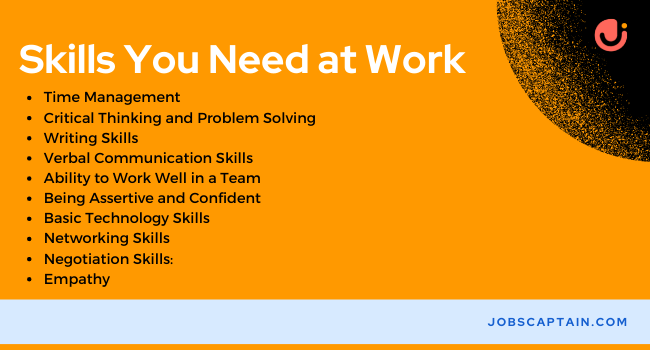
Here are some tips on effective career planning. Here are 10 skills you need at yours work.
Let’s read 10 Skills, that You shall Need at Work.
1. Time Management
The planned or unplanned activity makes a difference in your career management and any other work or activity that you do. Carrying out an activity by fits and starts, spasmodic and desultory dabbling never produces the same result as work carried on with a definite purpose and clear-cut lines. Thus, time management is an essential skill at work.
2. Critical Thinking and Problem Solving
Most jobs require problem solving at one time or another. Train your mind to think critically and develop powers of observation. Learn the six thinking hats technique to make critical decisions. You will become a more valuable employee by demonstrating your powers of critical and creative thinking.
3. Writing Skills
A huge majority of people feel that writing ability is needed only by those who are in the job of writing—like those connected with journalism, public relations or book writing. Well, they are wrong. Writing skills are core to office communication.
You cannot hope to get ahead in work if you fail to communicate clearly or express yourself in the right way. Today, emails and text-based messages are the primary forms of inter-and intra-office communication. Using slang or misspelt words or wrong grammar will always be major hurdles in your career growth chart.
4. Verbal Communication Skills
Verbal communication compliments writing skills and is an important requirement that every employer sees in you before hiring you. Whether it is related to giving a presentation or simply chatting in free time with office staff and your bosses, good verbal communication skill is always a plus. Besides, learn to talk to the point and give crisp arguments when required. Loose talk is a strict no.
Check out a useful article on Important Soft Skills Every Job Candidate Should Have.
5. Ability to Work Well in a Team
Proper cohesion between team members is important for success, be in any team sport or your office space. Hiring managers give a lot of importance to your ability to work well on a team, whether it’s for entry-level jobs or in higher positions.
If you have the ability to effectively collaborating with others, build trust with others, and handle criticism well, you’re the best person for any job.
6. Being Assertive and Confident
Learn to be self-confident. Yes, you can actually practice and develop self-confidence. However, you also need to learn to differentiate between self-confidence and arrogance.
Being aware of self and having confidence in oneself is a key ingredient of successful people. It is also important that you learn to confront when the situation demands. Being non-confrontational can hold you back in life.
7. Basic Technology Skills
Many people, who do not need to work directly with technology, shy away from learning about the professional office setting and basic skills and knowledge.
Knowing how to navigate your company’s website, how to use the company’s communication tools and just the basics of how computers work is useful when you need troubleshooting help. Of course, the more technical skills you add, the more you expand what you can do at work and improve your job prospects.
8. Networking Skills
Throw away your shyness in the nearest dustbin when you are attending a conference or even a party. Networking is an important skill that pays in the long run in charting out a successful career graph.
Networking not only helps you to get a better job but also helps you in work. It can help you land new clients, recruit new talent, and expand your professional circles.
9. Negotiation Skills:
Negotiation is an art that comes naturally to some but the majority of us need to learn the technique. Yes, you can learn the art of negotiation. These skills come in handy not only during salary negotiations, but also while resolving conflicts, finding win-win solutions for your team, and while dealing with clients and co-workers
10. Empathy
Empathy is the experience of understanding another person’s condition from their perspective. It is, in fact, your most important skill, at work and at home. You can improve your empathy by learning to really listen and practising trying to see things from others’ point of view.
If you can start to follow and learn these skills as soon as possible, you will be able to do so much more effective work throughout your life or job.
Thank you for reading an article on Career Planning: Skills You Need at Work. If you need more tips on anything, please do comment below.
